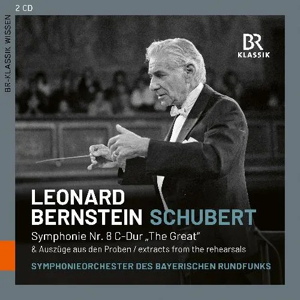
Franz Schubert (1797-1828)
Symphony No 9 in C major ‘Great’, D944 (1825-26)
Symphonieorchester des Bayerischen Rundfunks/Leonard Bernstein
rec. live 13 & 14 June 1987, Congress Hall, Deutsches Museum, Munich, Germany
Bonus CD: Conductors in Rehearsal
BR Klassik 900229 [2 CDs: 112]
This live performance of Schubert’s Ninth Symphony was recorded for radio broadcast by Bavarian Radio in the Congress Hall of the Deutsches Museum, Munich.
Schubert in his personal letters described this work as “a grand symphony”. It is dubbed the ‘Great’ C major Symphony to distinguish it from his earlier Sixth Symphony in C major, D 589 completed in 1818 and known as the ‘Little’ C major Symphony. On this release, the BR Klassik label uses the German designation of Symphony ‘No 8’; however, it is the English numbering system, ‘No 9’, much more commonly used by the major labels, that I use here.
Some ten tears after Schubert’s death, Robert Schumann unearthed the score of the ‘Great’ C major Ninth in Vienna amongst the manuscripts held by Franz’s brother Ferdinand and Mendelssohn conducted its posthumous première in Leipzig in 1839, using a cut version.
Renowned conductor Nikolaus Harnoncourt enthusiastically described the Ninth as “an immense structure in which Schubert reinvents the symphony” and opined that Schubert’s symphonies were still being harshly treated post-World War Two. Markedly, the Ninth Symphony would be performed without repeats and with severe cuts, that would lead to shorter performance times, by as much as fifteen minutes.
Bernstein first appeared in Munich in 1948, conducting the Bayerisches Staatsorchester at the Prinzregententheater. On that trip, he also conducted a pair of concerts, one at the Feldafing Displaced Persons camp and the other at the Landsberg DP camp, both near Munich. His orchestra was made up of Holocaust survivors, and as the child of Jewish-Ukrainian immigrant parents in Boston, he must have found the concerts to be an affecting experience for him.
Returning to Munich in 1976, Bernstein conducted the Symphonieorchester des Bayerischen Rundfunks at the Congress Hall, Deutschen Museums. The all-Beethoven programme comprised the Leonora Overture, Op 72b; the Piano Concerto No 4, Op 58 with soloist Claudio Arrau and the Symphony No 5, Op 67. By the 1980s, Bernstein had become a regular guest conductor in Munich, leading to him commencing a series of annual concerts in 1983 with the BRSO.
The Ninth Symphony begins with the entry of the unison horns followed by strings, and then woodwind introduces the opening movement marked Andante – Allegro ma non troppo – Più moto. Under Bernstein the overall feeling of this movement, so full of melody, is festive and rather impetuous, so that feels new and fresh. Bernstein doesn’t push the music too hard. As the determined character of the writing builds, Bernstein’s imparts a well-judged energy to its rhythms and dynamics, especially in the heroic splendour of the orchestral climax.
Marked Andante con moto, the second movement is notable for its march-like rhythms that under Bernstein are ebullient in character. By contrast, the song-like sections are gratifyingly beautiful. I notice that the excellent playing of the woodwind figures significantly. Bernstein revels in the Scherzo, a vibrant movement infused with appealing dance rhythms. The playing varies from the lightness of a caress to a contrasting restless, hard-hitting boisterousness. The Allegro vivace closing movement bursts onto the scene excitingly, Bernstein demanding a valiantly high level of energy. At 180 bars in length, the symphony’s immense coda ties all the various elements together.
Bernstein’s conducting is assured and agreeably judged. Compared to the leaner, medium-size orchestras familiar today, this 1987 performance uses a larger symphony orchestra, a practice sometimes referred to as ‘big-band’ Schubert. Under Bernstein, each orchestral section responds with playing of marvellous expertise and conviction.
The live radio broadcast sound, remastered for this release, is first-rate. Unwanted noise is minimal and the applause at the conclusion has been taken out.
I notice that this live Bernstein performance of the Ninth was filmed and is available on DVD from EuroArts. Of course, this isn’t Bernstein’s only recording of the Schubert Ninth. There are at least two other recordings: first, with the New York Philharmonic from 1967 at NYC on Sony and second the Concertgebouworkest from 1987 at Amsterdam on Deutsche Grammophon, but I am not familiar with either of them.
Bernstein’s recording of the Ninth Symphony competes with many rival recordings, of which I have selected two as primary recommendations: a standout recording is conducted by Claudio Abbado with the Orchestra Mozart assembled from live concerts in 2011 at Bologna and Bolzano, Italy (review). Released on Deutsche Grammophon Abbado’s captivating account has a wealth of orchestral detail, is quite beautifully played and is my go-to recording. The other very desirable account is by the Scottish Chamber Orchestra under Maxim Emelyanychev (review).
Another recording of the Ninth to have attracted many admirers is the Gewandhausorchester conducted by Herbert Blomstedt in 2021 in Leipzig on Deutsche Grammophon. Blomstedt’s coupled with the Eighth Symphony ‘Unfinished’ (review). Those who prefer the so-called ‘big-band’ Schubert could investigate this recording conducted by Karl Böhm, who was greatly associated with the composer’s music throughout his career.
A second bonus CD, titled ‘Conductors in Rehearsal’ and produced by Bavarian Radio, offers extracts of Bernstein rehearsing the Ninth with the BRSO. Friedrich Schloffer narrates in German, so it is of no real use to me as a non-German speaker.
This market for recordings of Schubert’s Ninth Symphony is fiercely congested and there are several that are undoubtedly praiseworthy. This account conducted by Bernstein is not one of my primary recommendations, but nevertheless has real merit and Bernstein advocates will surely want it.
Michael Cookson
Contents of bonus CD
Leonard Bernstein rehearses with the BRSO (narrated in German). With Leonard Bernstein & Friedrich Schloffer (narrators), Johannes Ritzkowsky (horn)
Buying this recording via a link below generates revenue for MWI, which helps the site remain free.




















